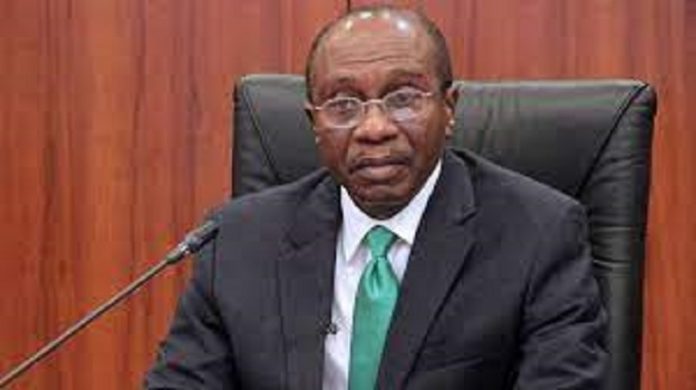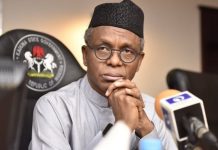Mr. Godwin Emefiele, Governor of the Central Bank of Nigeria (CBN), has reiterated the need for extensive structural reform this year in order to accelerate the country’s economic growth. This was stated by Emefiele in his personal statement at the most recent Monetary Policy Committee (MPC) meeting, a copy of which was posted on the CBN’s website yesterday.
The National Bureau of Statistics (NBS) reported that Nigeria’s Gross Domestic Product (GDP) grew by 4.03 percent in the third quarter (Q3) of 2021, compared to 5.01 percent in the previous quarter, due to the base-year effect. The federal government has also stated that one of the reforms it plans to implement this year is the elimination of the fuel subsidy, which has been described as a major drag on the economy.
“Extensive structural reforms are also needed to ensure that long-run growth paths exceed potential,” Emefiele said in the MPC communiqué.
The CBN governor predicted that as business sentiment improved as a result of the apex bank’s various supply-side interventions and the orderly implementation of macroeconomic policies, domestic fragility would decrease, with positive spillover effects on welfare and livelihood.
“Our medium-term goal is to accelerate growth above the historic average,” he said. If non-oil activities (especially agriculture and manufacturing) are given continued impetus, economic activity could return to pre-pandemic levels.”
In November 2021, Nigeria’s headline inflation rate fell for the eighth month in a row, to 15.4 percent.
This, according to Emefiele, reflected a decrease in inflation in both food and core components.
“Regardless,” he said, “inflation remained at unacceptable levels, propped up by structural flaws.” Inflation expectations are expected to moderate further in the short term, especially as development financing continues to resolve supply constraints.
“Analysis of the monetary situation revealed a tepid result during the review period, with mixed interest rate movements.” In October 2021, the weighted average interbank call rate fell 3.21 percentage points to 10%, while the open-buy-back rate increased 1.07 percentage points to 12.18 percent.
“Monetary aggregates increased in October, but at a slower pace than expected. Broad money growth was 2.54 percentage points lower than the benchmark, at 7.10 percent.
“However, the observed growth was attributed to a 9.12% increase in net domestic assets underpinned by private sector credits.”
With a capital adequacy ratio (CAR) of 15.2 percent, a liquidity ratio of 41.2 percent, and a non-performing loans (NPLs) ratio of 5.3 percent, Emefiele noted that the banking system remained stable and resilient.
He did admit, however, that despite increased external reserves, exchange rate pressure had persisted in the forex market, despite positive capital market metrics.
Dr. Kingsley Obiora, Deputy Governor of the Central Bank of Nigeria’s Economic Policy Directorate, has called for the implementation of more growth-inducing policies to boost economic activity. He stated that this is why he supports the CBN’s current “100 for 100” policy on Production and Productivity (PPP).
“The policy will boost manufacturing production; reduce imports and expand non-oil exports; improve external reserve accretion; and ensure exchange rate stability,” Obiora said.
“Also, the Tertiary Institutions Entrepreneurship Scheme (TIES), which will be launched in November 2021, will promote entrepreneurship and economic growth in strategic sectors of the economy, as well as address the country’s youth unemployment challenges.”
“However, given Nigeria’s massive investment needs and limited fiscal space, we must continue to use Public-Private Partnerships to attract the private sector to critical sectors of the economy” (PPP). This agreement will boost infrastructure, human capital, and other critical economic sectors’ efficiency and productivity on a long-term basis.”
Read Also: Biafra National Anthem: Ndigbo lives are at risk – Ohanaeze criticizes IPOB
Mr. Edward Adamu, CBN Deputy Governor, Corporate Services Directorate, stated in his contribution that the economy had yet to return to pre-pandemic levels on several fronts, despite the positive outcomes so far on inflation and growth.
“The surest bet to alleviating poverty is growth in employment, which is tied to economic (output) expansion,” he said, adding that “employment growth is tied to economic (output) expansion.”
“In order to generate more jobs, the economy must expand at a faster rate than it did up until the third quarter of 2021.” Even with the overall real growth rate of 4.03 percent in Q3, some sectors (activities) continued to struggle.
“Oil and gas, fishing, and oil refining stood out among them. In the short to medium term, these activities, as well as a few others that barely crossed the line, will require policy support.
“Vulnerabilities on the horizon, such as new coronavirus variants driving infection resurgence, bolster the need to sustain liquidity support to key economic activities.”
“Inflation is falling at a rapid rate, owing primarily to a concerted effort to boost supply rather than a drop in demand.”
“The current trajectory is expected to be maintained through the first quarter of 2022, barring any major shocks.” In contrast to most other countries, the recovery in domestic demand has not resulted in new price shocks.
Read Also: Air Force announces the appointment of new branch chiefs, commanding officers
“Not only has output increased rapidly, but the liquidity management strategy has kept banking system liquidity near optimal levels.”
Professor Adeola Adenikinju, a member of the MPC, expressed concern about “the uncertainty around 2022, given that it is a pre-election year,” noting that “usually, foreign investors are less likely to commit to new investment in the country, affecting foreign exchange reserves.”
“Going forward, there is a need to harmonise monetary policy with the newly approved Medium-Term National Development Plan’s monetary and development targets,” Adenikinju said.
“The intervention fund should also be decomposed into those that went to boost aggregate demand and those that went to expand the economy’s supply base.” The pace of winding down the interventions in 2022 should be guided by a careful examination of the contributions of these interventions.
“The CBN must continue to look for ways to de-risk the economy’s critical sectors so that deposit money banks can lend to them.”
“Because the CBN’s interventions cannot be sustained indefinitely, domestic banks must assume responsibility for supporting household credit and MSMEs.” The government should address the unsustainable nature of the gasoline subsidy as soon as possible.”
Professor Mike Obadan, another MPC member, said that the rising debt service-to-revenue ratio, which is now over 90%, was putting a strain on already-scarce fiscal resources and could make it difficult to fund critical government programs and projects.
Read Also: Jonathan’s consultations to run for president in 2023 have triggered mixed reactions
“The government’s fiscal capacity remains weak,” Obadan said, “amid limited domestic revenue mobilization and little or no foreign exchange inflow from oil and gas exports.”
“Continued monetary support is required to propel economic activity along the desired sustainable growth path.”
Join Television Nigerian Whatsapp Now
Join Television Nigerian Facebook Now
Join Television Nigerian Twitter Now
Join Television Nigerian YouTUbe Now





